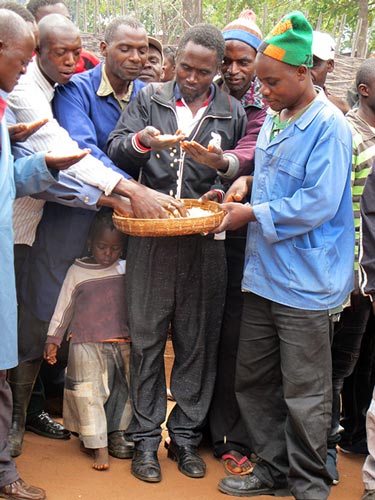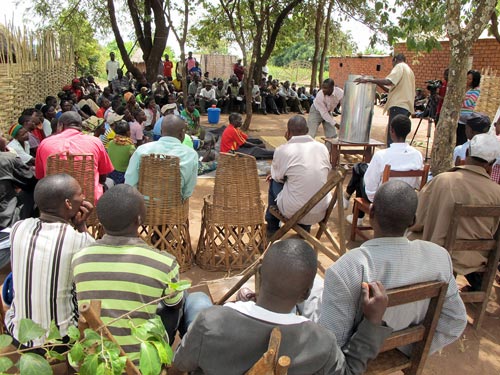By Wandera Ojanji/CIMMYT
The Effective Grain Storage for Sustainable Livelihoods of African Farmers Project (EGSP) Phase-II held a series of field days in Malawi and Zambia to raise awareness and demonstrate the efficacy of metal silos in protecting stored grains against weevils and larger grain borers – the two most destructive storage insect pests of maize. The project is funded by the Swiss Agency for Development and Cooperation (SDC).

During the events, farmers compared the good-quality grain stored in a silo to the damaged grain stored in traditional structures and gunny bags. Artisans and extension officers also demonstrated the proper use and handling of a metal silo. The first field day was held on 8 April at Banda Jessy’s farm in Chimtende Camp, Katete District, Eastern Province, Zambia. More than 160 farmers, metal silo artisans, agricultural officers and local leaders attended the event.
Metal silos have many benefits, said Dolan Mulumbu, Chimtende camp officer. They have the ability to store grain for many years without damage, don’t require insecticides, are portable and are insect- and rodent-proof. They also give farmers flexibility on when to sell their grain and allow them to store grain for their families. Greyson Phiri, Sambira Village headman, thanked CIMMYT for bringing the metal silo technology to farmers.
The second field day in Zambia was held on 9 April at Peter Mwanza’s homestead in the Kamlaza Agricultural Camp, Chipata District, Eastern Province. The field day was attended by more than 270 farmers from the camp. Most farmers in the area sell their grain immediately after harvest for fear of it being destroyed by post-harvest pests.
Moffat Khosa, of the Zambian Ministry of Agriculture’s Department of Mechanization, urged farmers to adopt the technology to help them avoid selling their grain immediately after harvest – when the prices average US$ 10 per 50 kilogram bag – and sell at a higher price later in the season. He challenged farmers to invest in post-harvest technologies as much as they are investing in other farm inputs, such as seed and fertilizer.

More than 240 farmers attended the third field day on 11 April at Frank Renadi’s farm in Kapsala Village, Chigonti Extension Planning Area, Lilongwe District, Malawi. It was attended by Wilfred Lipita, controller of Agriculture Extension and Technical Services; Godfrey Ching’oma, director of Crop Development; his deputy, Bartholomew Ngauma; Penjani Theu, program manager, Lilongwe Agricultural Development Division; district development officers from Lilongwe and Mchinji; and local leaders from Chigothi. Lipita urged farmers to take advantage of the 50-50 cost-sharing offer from the project to acquire metal silos, adding that those who cannot afford to pay 50 percent can opt for cheaper super grain bags.
The project intends to distribute 7,500 super grain bags to smallholder farmers in the Lilongwe and Mchinji districts for demonstration. “The crop in the field needs to be protected from maize weevils and larger grain borers, rodents and ambient moisture fluctuations,” Lipita said. “Where the crop has done well, there is need for farmers to jealously guard the crop so that there are no post-harvest losses.”
 Capacity development
Capacity development 
